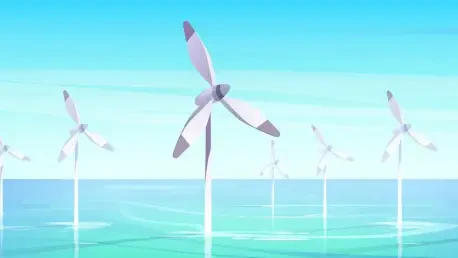Why is a project capable of powering over 700,000 homes suddenly at risk of being scrapped, and what does this mean for America’s renewable energy future? Picture a vast stretch of ocean off Maryland’s coast, where towering wind turbines could soon harness the breeze to fuel a cleaner future—yet, this vision hangs in the balance. The Trump administration has set its sights on revoking federal approval for US Wind’s ambitious offshore wind farm, a decision that could ripple through America’s renewable energy landscape. This bold move has ignited fierce debate, pulling back the curtain on a clash between green innovation and competing national priorities.
A Critical Blow to Clean Energy—Why It Matters
The Maryland Offshore Wind Project, initially greenlit under the Biden administration, stands as a flagship for renewable progress, designed to generate electricity for up to 718,000 households. Its potential cancellation under President Trump’s directive isn’t just a local setback—it’s a signal of a broader retreat from offshore wind as a key pillar of America’s fight against climate change. With carbon emissions still climbing, projects like this are vital for slashing greenhouse gases, making this policy reversal a pivotal moment for environmental goals.
This story transcends a single wind farm; it underscores a fundamental tension in national policy. On one hand, offshore wind offers a path to energy independence and sustainability; on the other, the current administration cites economic burdens and security risks as reasons to halt such initiatives. The outcome of this battle could shape the trajectory of clean energy development for years to come, demanding close attention from stakeholders and citizens alike.
The Wider War on Offshore Wind
Offshore wind energy has been hailed as a game-changer, with the capacity to power millions of homes while curbing reliance on fossil fuels. Yet, under Trump’s leadership, the sector faces a barrage of obstacles, from suspended leasing for new projects to outright stop-work orders. The Maryland project’s plight mirrors a pattern—since Trump took office, new offshore wind leasing was halted on day one for environmental and economic reviews, casting doubt on the industry’s growth.
This isn’t an isolated incident but part of a systematic pushback. A nearly completed project off Rhode Island, for instance, was paused over national security concerns, reflecting a recurring theme of prioritizing other interests over renewable energy. Such actions threaten to derail America’s progress toward net-zero emissions, raising questions about how the nation will meet its climate commitments amid these sweeping policy shifts.
Legal Maneuvers and Hidden Agendas
The Trump administration’s strategy to dismantle the Maryland project hinges on precise legal tactics. A federal court filing on August 25 in Delaware seeks to stay a lawsuit challenging the project’s approval by the Interior Department, while a parallel move in a Maryland federal court aims to vacate the construction and operations plan by September 12. This latter action, spurred by Ocean City officials, argues that nullifying the approval would render other legal challenges irrelevant.
Beyond Maryland, similar efforts to stall wind projects reveal a coordinated approach. The Rhode Island stop-work order, tied to unspecified security risks, exemplifies how the administration leverages diverse justifications to slow progress. Critics argue these moves mask a deeper disdain for wind energy, often labeled by Trump as visually unappealing and financially unviable, even as studies show offshore wind could cut carbon emissions by millions of tons annually if scaled effectively.
Voices in the Storm—Who’s Speaking Out?
Amid the legal and political turbulence, stakeholders are making their positions clear. Nancy Sopko, Vice President of External Affairs at US Wind, remains steadfast, emphasizing the durability of their federal permits after a rigorous, multi-year public review process. Her confidence signals a readiness to fight for the project in court, viewing the approvals as legally sound despite the mounting opposition.
Contrastingly, President Trump has repeatedly criticized wind energy as unreliable and overpriced, framing it as a poor investment for the nation. Environmental advocates push back, highlighting that offshore wind is indispensable for tackling global warming, with data suggesting it could power over 25 million homes nationwide by 2030 if barriers are lifted. Meanwhile, the Interior Department’s silence on the court filings adds a layer of mystery, hinting at internal caution or strategic restraint in this high-stakes conflict.
Charting a Path Forward—Solutions Amid Crisis
With offshore wind under siege, actionable steps are crucial for those invested in its survival. Renewable energy supporters can bolster legal defenses by contributing to advocacy campaigns or staying updated on court rulings through public resources. Grassroots efforts to raise awareness about the benefits of projects like Maryland’s can also sway public opinion, pressuring policymakers to reconsider sweeping cancellations.
For legislators, a balanced framework is needed—one that addresses legitimate security and economic concerns without sacrificing climate imperatives. Streamlined yet thorough environmental reviews could prevent delays while ensuring safety, offering a middle ground. Concerned citizens, meanwhile, should monitor policy updates and engage with local representatives to advocate for sustained investment in clean energy, ensuring their voices shape the debate as legal battles unfold.
In reflecting on this saga, it became evident that the Trump administration’s push to cancel the Maryland offshore wind project marked a defining chapter in America’s energy narrative. The clash between immediate national priorities and long-term environmental needs stood out as a persistent hurdle. Looking back, the resilience of companies like US Wind in defending their permits offered a glimmer of hope, yet the broader uncertainty lingered. Moving ahead, prioritizing bipartisan dialogue to safeguard renewable projects emerged as a vital step, alongside fostering public support to ensure that clean energy remained a cornerstone of national progress.









